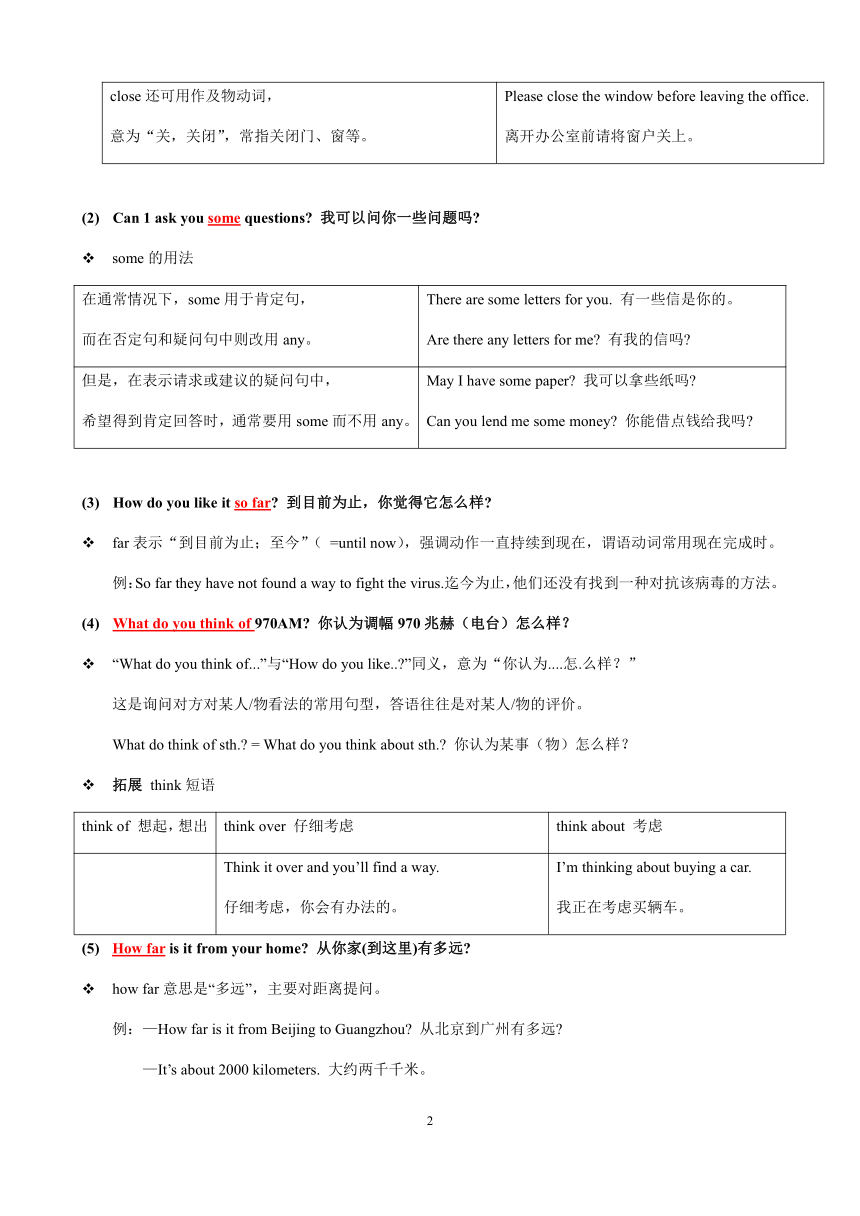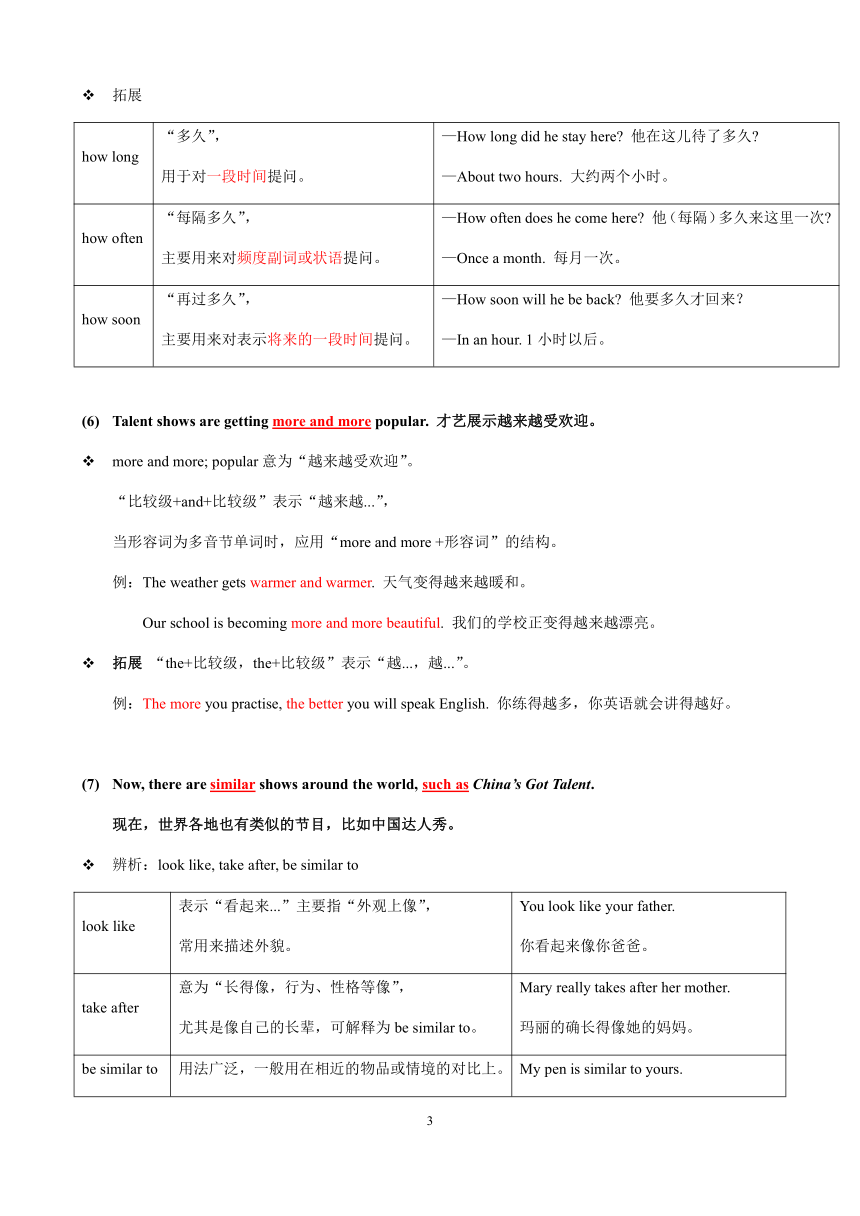人教版八年级上册英语Unit 4 What’s the best movie theater? 知识点语法归纳总结
文档属性
| 名称 | 人教版八年级上册英语Unit 4 What’s the best movie theater? 知识点语法归纳总结 |

|
|
| 格式 | zip | ||
| 文件大小 | 26.4KB | ||
| 资源类型 | 教案 | ||
| 版本资源 | 人教新目标(Go for it)版 | ||
| 科目 | 英语 | ||
| 更新时间 | 2020-08-03 00:00:00 | ||
图片预览



文档简介
Unit
4
What’s
the
best
movie
theater?
短语归纳
so
far
到目前为止,迄今为止
no
problem
没什么,别客气
have….in
common
有相同特征(想法、兴趣等方面)相同
be
up
to由…决定/是…的职责
all
kinds
of
…各种各样的……
play
a
role
发挥作用,有影响
make
up
编造(故事、谎言等)
for
example=eg例如,
take
…..seriously
认真对待
not
everybody并不是每个人
close
to
离….近
more
and
more
越来越……
典句必背
Can
I
ask
you
some
questions?
我能问你一些问题吗?
It
has
the
most
comfortable
seats.
它有最舒服的座位。
How
do
you
like
it
so
far?
到目前为止你认为它怎么样?
Which
is
the
worst
clothes
store
in
town?
城镇里最差的服装店是哪一家?
Everyone
is
good
at
something.
每个人都各有所长。
It’s
always
interesting
to
watch
other
people
show
their
talents.观看别人展示他们的天赋总是很有趣。
All
these
shows
have
one
thing
in
common.所有这些节目有一个共同之处。
That’s
up
to
you
to
decide.
这由你来决定。
用法集萃
It’s
the
closest
to
home.它离家最近。
close作形容词时,意为“(空间时间上)近的”,常构成固定搭配be
close
to,意为“离...近”。
例:The
supermarket
is
close
to
my
house.
超市离我家很近。
拓展
close作形容词时,还可意为“(关系)密切的,亲密的”
She
is
a
close
friend
of
theirs.
她是他们的挚友。
close还可用作及物动词,
意为“关,关闭”,常指关闭门、窗等。
Please
close
the
window
before
leaving
the
office.
离开办公室前请将窗户关上。
Can
1
ask
you
some
questions?
我可以问你一些问题吗?
some的用法
在通常情况下,some用于肯定句,
而在否定句和疑问句中则改用any。
There
are
some
letters
for
you.
有一些信是你的。
Are
there
any
letters
for
me?
有我的信吗?
但是,在表示请求或建议的疑问句中,
希望得到肯定回答时,通常要用some而不用any。
May
I
have
some
paper?
我可以拿些纸吗?
Can
you
lend
me
some
money?
你能借点钱给我吗?
How
do
you
like
it
so
far?
到目前为止,你觉得它怎么样?
far表示“到目前为止;至今”(
=until
now),强调动作一直持续到现在,谓语动词常用现在完成时。
例:So
far
they
have
not
found
a
way
to
fight
the
virus.迄今为止,他们还没有找到一种对抗该病毒的方法。
What
do
you
think
of
970AM?
你认为调幅970兆赫(电台)怎么样?
“What
do
you
think
of...”与“How
do
you
like..?”同义,意为“你认为....怎.么样?”
这是询问对方对某人/物看法的常用句型,答语往往是对某人/物的评价。
What
do
think
of
sth.?
=
What
do
you
think
about
sth.?
你认为某事(物)怎么样?
拓展
think短语
think
of
想起,想出
think
over
仔细考虑
think
about
考虑
Think
it
over
and
you’ll
find
a
way.
仔细考虑,你会有办法的。
I’m
thinking
about
buying
a
car.
我正在考虑买辆车。
How
far
is
it
from
your
home?
从你家(到这里)有多远?
how
far意思是“多远”,主要对距离提问。
例:—How
far
is
it
from
Beijing
to
Guangzhou?
从北京到广州有多远?
—It’s
about
2000
kilometers.
大约两千千米。
拓展
how
long
“多久”,
用于对一段时间提问。
—How
long
did
he
stay
here?
他在这儿待了多久?
—About
two
hours.
大约两个小时。
how
often
“每隔多久”,
主要用来对频度副词或状语提问。
—How
often
does
he
come
here?
他(每隔)多久来这里一次?
—Once
a
month.
每月一次。
how
soon
“再过多久”,
主要用来对表示将来的一段时间提问。
—How
soon
will
he
be
back?
他要多久才回来?
—In
an
hour.
1小时以后。
Talent
shows
are
getting
more
and
more
popular.
才艺展示越来越受欢迎。
more
and
more;
popular意为“越来越受欢迎”。
“比较级+and+比较级”表示“越来越...”,
当形容词为多音节单词时,应用“more
and
more
+形容词”的结构。
例:The
weather
gets
warmer
and
warmer.
天气变得越来越暖和。
Our
school
is
becoming
more
and
more
beautiful.
我们的学校正变得越来越漂亮。
拓展
“the+比较级,the+比较级”表示“越...,越...”。
例:The
more
you
practise,
the
better
you
will
speak
English.
你练得越多,你英语就会讲得越好。
Now,
there
are
similar
shows
around
the
world,
such
as
China’s
Got
Talent.
现在,世界各地也有类似的节目,比如中国达人秀。
辨析:look
like,
take
after,
be
similar
to
look
like
表示“看起来...”主要指“外观上像”,
常用来描述外貌。
You
look
like
your
father.
你看起来像你爸爸。
take
after
意为“长得像,行为、性格等像”,
尤其是像自己的长辈,可解释为be
similar
to。
Mary
really
takes
after
her
mother.
玛丽的确长得像她的妈妈。
be
similar
to
用法广泛,一般用在相近的物品或情境的对比上。
My
pen
is
similar
to
yours.
我的钢笔和你的相似。
辨析:for
example,
such
as
for
example
只以同类人或物中的“一个”为例,作插入语,用逗号隔开,可置于句首、句中、句末。
Noise,
for
example,
is
a
kind
of
pollution.
例如,噪声就是一种污染。
such
as
常列举同类人或物中的几个例子,不能穷尽,
可和and
so
on连用。
I
have
many
hobbies
such
as
reading,
dancing
and
singing.
我有很多爱好,比如读书、跳舞和唱歌。
All
these
shows
have
one
thing
in
common...所有的这些节目都有一个共同点...
have...in
common“有相同特征;(想法、兴趣等方面)相同”
have
nothing
in
common“没有共同点”
例:The
two
sisters
have
nothing
in
common.
这两姐妹没有什么共同之处。
That’s
up
to
you
to
decide.
那由你来决定。
be
up
to意为“是...的职责,由....决定”。
在英语中be
up
to有很多种用法:
be
up
to
sb.
表示“胜任,
适于(做某事)”,
后面接名词、代词或动名词等。
He
is
not
really
up
to
seeing
any
visitors.
他真的不适合见任何访问者。
be
up
to
sb.
由某人决定
Whether
we
will
go
to
the
park
is
up
to
your
brother.
我们是否去公园由你哥哥决定。
It
is
up
to
sb.
to
do
sth.
应由某人做某事,
it作形式主语。
It
is
up
to
me
to
get
the
four
of
us
moving.
该由我来召集我们四个人动起来。
When
people
watch
the
show,
they
usually
play
a
role
in
deciding
the
winner.
人们看这样的节目时,通常承担着评判优胜者的角色。
play
a
role意为“发挥作用;有影响”。
如果要进一步引出具体的内容,后面应用介词in,
表示“在某事/某个方面起到作用或承担某种角色”,后跟名词、代词或动名词。
例:The
media
play
a
major
role
in
influencing
people's
opinions.
媒体在影响舆论方面发挥着重要作用。
Some
think
that
the
lives
of
the
performers
are
made
up.
有些人认为那些表演者的生活状况都是编造出来的。
make
up意为“编造,组成”。
句中的“are
made
up”属于被动语态结构,其构成为“be+过去分词”,表示“被......”。
例:The
whole
story
is
made
up.
整个故事完全是虚构的
I
think
it’s
very
unkind
of
you
to
make
up
stories
about
him.
我认为你编造他的谣言很不厚道。
语法聚焦:形容词和副词最高级变化及运用
形容词和副词最高级变化规则如下
最高级的变化规则
例词
单音节词和部分双音节词
一般在词尾加-est
tall→tallest
以字母e结尾的词,在词尾直接加-st
fine→finest
nice→nicest
以“辅音字母+y”结尾的双音节词,
变“y”为“i”加-est
easy→easiest
early→earliest
重读闭音节词词尾只有一个辅音字母时,
先双写该辅音字母,再加-est
big→biggest
thin→thinnest
fat→fattest
多音节词和部分双音节词在词前加most
outgoing→most
outgoing
个别不规则变化特例
much→most
good/well→best
bad/ill→worst
另外,多音节形容词前加less和least也能构成比较级和最高级,
但此时表示“比较不”和“最不”。
例:important重要的
→
less
important
更不重要的
→
least
important
最不重要的
形容词与副词最高级的基本用法
用法
释义及例句
三者或三者以上的人或事物进行比较,
其中一个在某方面超过其他几个时用最高级。
形容词的最高级前一般要加定冠词the,
后带含of或in的表示范围的短语
(如of
all、of
he
three
、in
the
world
等)。
He
is
the
most
outgoing
of
all.
他是所有人中最外向的。
在表达“第几(长、大,远...)”时,
序数词后用形容词的最高级形式。
He
is
the
second
tallest
boy
in
his
class.
他是班上第二高的男孩。
在表达“最.....之一”时,
用最高级。
“one
of
the+形容词的最高级+可数名词复数”
Chongqing
is
one
of
the
biggest
cities
in
our
country.
重庆是我们国家最大的城市之一。
在表达“某人的最...的....”时,最高级前省略定冠词the,
即“某人的+形容词的最高级+名词”
Linda
is
my
younger
sister’s
best
friend.
琳达是我妹妹最好的朋友。
4
What’s
the
best
movie
theater?
短语归纳
so
far
到目前为止,迄今为止
no
problem
没什么,别客气
have….in
common
有相同特征(想法、兴趣等方面)相同
be
up
to由…决定/是…的职责
all
kinds
of
…各种各样的……
play
a
role
发挥作用,有影响
make
up
编造(故事、谎言等)
for
example=eg例如,
take
…..seriously
认真对待
not
everybody并不是每个人
close
to
离….近
more
and
more
越来越……
典句必背
Can
I
ask
you
some
questions?
我能问你一些问题吗?
It
has
the
most
comfortable
seats.
它有最舒服的座位。
How
do
you
like
it
so
far?
到目前为止你认为它怎么样?
Which
is
the
worst
clothes
store
in
town?
城镇里最差的服装店是哪一家?
Everyone
is
good
at
something.
每个人都各有所长。
It’s
always
interesting
to
watch
other
people
show
their
talents.观看别人展示他们的天赋总是很有趣。
All
these
shows
have
one
thing
in
common.所有这些节目有一个共同之处。
That’s
up
to
you
to
decide.
这由你来决定。
用法集萃
It’s
the
closest
to
home.它离家最近。
close作形容词时,意为“(空间时间上)近的”,常构成固定搭配be
close
to,意为“离...近”。
例:The
supermarket
is
close
to
my
house.
超市离我家很近。
拓展
close作形容词时,还可意为“(关系)密切的,亲密的”
She
is
a
close
friend
of
theirs.
她是他们的挚友。
close还可用作及物动词,
意为“关,关闭”,常指关闭门、窗等。
Please
close
the
window
before
leaving
the
office.
离开办公室前请将窗户关上。
Can
1
ask
you
some
questions?
我可以问你一些问题吗?
some的用法
在通常情况下,some用于肯定句,
而在否定句和疑问句中则改用any。
There
are
some
letters
for
you.
有一些信是你的。
Are
there
any
letters
for
me?
有我的信吗?
但是,在表示请求或建议的疑问句中,
希望得到肯定回答时,通常要用some而不用any。
May
I
have
some
paper?
我可以拿些纸吗?
Can
you
lend
me
some
money?
你能借点钱给我吗?
How
do
you
like
it
so
far?
到目前为止,你觉得它怎么样?
far表示“到目前为止;至今”(
=until
now),强调动作一直持续到现在,谓语动词常用现在完成时。
例:So
far
they
have
not
found
a
way
to
fight
the
virus.迄今为止,他们还没有找到一种对抗该病毒的方法。
What
do
you
think
of
970AM?
你认为调幅970兆赫(电台)怎么样?
“What
do
you
think
of...”与“How
do
you
like..?”同义,意为“你认为....怎.么样?”
这是询问对方对某人/物看法的常用句型,答语往往是对某人/物的评价。
What
do
think
of
sth.?
=
What
do
you
think
about
sth.?
你认为某事(物)怎么样?
拓展
think短语
think
of
想起,想出
think
over
仔细考虑
think
about
考虑
Think
it
over
and
you’ll
find
a
way.
仔细考虑,你会有办法的。
I’m
thinking
about
buying
a
car.
我正在考虑买辆车。
How
far
is
it
from
your
home?
从你家(到这里)有多远?
how
far意思是“多远”,主要对距离提问。
例:—How
far
is
it
from
Beijing
to
Guangzhou?
从北京到广州有多远?
—It’s
about
2000
kilometers.
大约两千千米。
拓展
how
long
“多久”,
用于对一段时间提问。
—How
long
did
he
stay
here?
他在这儿待了多久?
—About
two
hours.
大约两个小时。
how
often
“每隔多久”,
主要用来对频度副词或状语提问。
—How
often
does
he
come
here?
他(每隔)多久来这里一次?
—Once
a
month.
每月一次。
how
soon
“再过多久”,
主要用来对表示将来的一段时间提问。
—How
soon
will
he
be
back?
他要多久才回来?
—In
an
hour.
1小时以后。
Talent
shows
are
getting
more
and
more
popular.
才艺展示越来越受欢迎。
more
and
more;
popular意为“越来越受欢迎”。
“比较级+and+比较级”表示“越来越...”,
当形容词为多音节单词时,应用“more
and
more
+形容词”的结构。
例:The
weather
gets
warmer
and
warmer.
天气变得越来越暖和。
Our
school
is
becoming
more
and
more
beautiful.
我们的学校正变得越来越漂亮。
拓展
“the+比较级,the+比较级”表示“越...,越...”。
例:The
more
you
practise,
the
better
you
will
speak
English.
你练得越多,你英语就会讲得越好。
Now,
there
are
similar
shows
around
the
world,
such
as
China’s
Got
Talent.
现在,世界各地也有类似的节目,比如中国达人秀。
辨析:look
like,
take
after,
be
similar
to
look
like
表示“看起来...”主要指“外观上像”,
常用来描述外貌。
You
look
like
your
father.
你看起来像你爸爸。
take
after
意为“长得像,行为、性格等像”,
尤其是像自己的长辈,可解释为be
similar
to。
Mary
really
takes
after
her
mother.
玛丽的确长得像她的妈妈。
be
similar
to
用法广泛,一般用在相近的物品或情境的对比上。
My
pen
is
similar
to
yours.
我的钢笔和你的相似。
辨析:for
example,
such
as
for
example
只以同类人或物中的“一个”为例,作插入语,用逗号隔开,可置于句首、句中、句末。
Noise,
for
example,
is
a
kind
of
pollution.
例如,噪声就是一种污染。
such
as
常列举同类人或物中的几个例子,不能穷尽,
可和and
so
on连用。
I
have
many
hobbies
such
as
reading,
dancing
and
singing.
我有很多爱好,比如读书、跳舞和唱歌。
All
these
shows
have
one
thing
in
common...所有的这些节目都有一个共同点...
have...in
common“有相同特征;(想法、兴趣等方面)相同”
have
nothing
in
common“没有共同点”
例:The
two
sisters
have
nothing
in
common.
这两姐妹没有什么共同之处。
That’s
up
to
you
to
decide.
那由你来决定。
be
up
to意为“是...的职责,由....决定”。
在英语中be
up
to有很多种用法:
be
up
to
sb.
表示“胜任,
适于(做某事)”,
后面接名词、代词或动名词等。
He
is
not
really
up
to
seeing
any
visitors.
他真的不适合见任何访问者。
be
up
to
sb.
由某人决定
Whether
we
will
go
to
the
park
is
up
to
your
brother.
我们是否去公园由你哥哥决定。
It
is
up
to
sb.
to
do
sth.
应由某人做某事,
it作形式主语。
It
is
up
to
me
to
get
the
four
of
us
moving.
该由我来召集我们四个人动起来。
When
people
watch
the
show,
they
usually
play
a
role
in
deciding
the
winner.
人们看这样的节目时,通常承担着评判优胜者的角色。
play
a
role意为“发挥作用;有影响”。
如果要进一步引出具体的内容,后面应用介词in,
表示“在某事/某个方面起到作用或承担某种角色”,后跟名词、代词或动名词。
例:The
media
play
a
major
role
in
influencing
people's
opinions.
媒体在影响舆论方面发挥着重要作用。
Some
think
that
the
lives
of
the
performers
are
made
up.
有些人认为那些表演者的生活状况都是编造出来的。
make
up意为“编造,组成”。
句中的“are
made
up”属于被动语态结构,其构成为“be+过去分词”,表示“被......”。
例:The
whole
story
is
made
up.
整个故事完全是虚构的
I
think
it’s
very
unkind
of
you
to
make
up
stories
about
him.
我认为你编造他的谣言很不厚道。
语法聚焦:形容词和副词最高级变化及运用
形容词和副词最高级变化规则如下
最高级的变化规则
例词
单音节词和部分双音节词
一般在词尾加-est
tall→tallest
以字母e结尾的词,在词尾直接加-st
fine→finest
nice→nicest
以“辅音字母+y”结尾的双音节词,
变“y”为“i”加-est
easy→easiest
early→earliest
重读闭音节词词尾只有一个辅音字母时,
先双写该辅音字母,再加-est
big→biggest
thin→thinnest
fat→fattest
多音节词和部分双音节词在词前加most
outgoing→most
outgoing
个别不规则变化特例
much→most
good/well→best
bad/ill→worst
另外,多音节形容词前加less和least也能构成比较级和最高级,
但此时表示“比较不”和“最不”。
例:important重要的
→
less
important
更不重要的
→
least
important
最不重要的
形容词与副词最高级的基本用法
用法
释义及例句
三者或三者以上的人或事物进行比较,
其中一个在某方面超过其他几个时用最高级。
形容词的最高级前一般要加定冠词the,
后带含of或in的表示范围的短语
(如of
all、of
he
three
、in
the
world
等)。
He
is
the
most
outgoing
of
all.
他是所有人中最外向的。
在表达“第几(长、大,远...)”时,
序数词后用形容词的最高级形式。
He
is
the
second
tallest
boy
in
his
class.
他是班上第二高的男孩。
在表达“最.....之一”时,
用最高级。
“one
of
the+形容词的最高级+可数名词复数”
Chongqing
is
one
of
the
biggest
cities
in
our
country.
重庆是我们国家最大的城市之一。
在表达“某人的最...的....”时,最高级前省略定冠词the,
即“某人的+形容词的最高级+名词”
Linda
is
my
younger
sister’s
best
friend.
琳达是我妹妹最好的朋友。
同课章节目录
- Unit 1 Where did you go on vacation?
- Section A
- Section B
- Unit 2 How often do you exercise?
- Section A
- Section B
- Unit 3 I'm more outgoing than my sister.
- Section A
- Section B
- Unit 4 What's the best movie theater?
- Section A
- Section B
- Unit 5 Do you want to watch a game show?
- Section A
- Section B
- Unit 6 I'm going to study computer science.
- Section A
- Section B
- Unit 7 Will people have robots?
- Section A
- Section B
- Unit 8 How do you make a banana milk shake?
- Section A
- Section B
- Unit 9 Can you come to my party?
- Section A
- Section B
- Unit 10 If you go to the party, you'll have a grea
- Section A
- Section B
